A shocking discovery awaited Les Whitaker upon his return from a month-long holiday in India. The 75-year-old grandfather arrived home to find a monumental extension, described as a "massive eyesore," looming just beyond his garden. The new structure, significantly larger than his own bungalow, had been erected without his knowledge during his absence, igniting a wave of frustration and concern.
Whitaker had no indication that planning permission had been granted for the substantial two-storey addition to his neighbour’s property, which includes a garage and storage area. He claims that the information about the development was never communicated to him, asserting that had he been aware, he would have strongly opposed the project. "I had no knowledge about what was happening at all," he expressed, highlighting a concerning change in local council policy that limits resident notifications regarding planning applications, a move supposedly made during the COVID-19 pandemic.
Local authorities, particularly Shropshire Council, maintain that they adhered to legal requirements to publicise the development via a site notice and availability on their planning portal. Nonetheless, Whitaker's discontent echoes a growing sentiment among residents who feel increasingly sidelined in the planning process. The council encourages residents to sign up for updates on planning applications, yet this relies on individuals proactively seeking information, placing the onus on them rather than ensuring proper notifications are sent out.
Cases like Whitaker's are not isolated phenomena. Similar unfortunate scenarios have seen residents discovering significant changes to their homes and neighbourhoods under contentious circumstances. A woman in Atlanta returned from holiday only to find her family home had been mistakenly demolished by a construction company's error in addressing. She has since pursued legal recourse to rectify this grave mistake. This incident draws parallels to the experiences of other residents who have faced unexpected developments affecting their properties or living conditions, often leading to disputes and calls for stricter regulations.
Moreover, the case of Peter Dick, who built a £500,000 bungalow on protected greenbelt land in Dorset without appropriate planning consent, underscores the lack of compliance and effective enforcement in planning processes. Despite multiple enforcement notices, his construction remains standing, raising questions about the ability of authorities to manage illegal developments effectively.
In another instance, residents of a retirement village in East Yorkshire are grappling with potential eviction due to a planning dispute. They argue that their understanding of the site's purpose was misrepresented at the time of purchase, showcasing a potential breakdown in communication between council bodies and residents that can lead to disputes and distress.
As councils adapt their policies to meet contemporary challenges, including housing shortages and urban development demands, resident engagement and transparency must not falter. Whitaker's plight serves as a compelling reminder that local planning decisions can have profound impacts on individuals and communities. As he contemplates the devaluation of his property and the possibility of relocating, his experience ignites a broader conversation about the rights of residents and their capacity to influence developments that so directly affect their lives.
While local councils continue to publish notices and provide access to planning information, the shift towards a more passive communication approach poses risks of disenfranchisement among residents. Whitaker's case calls for a reassessment of how local authorities can better inform and involve communities in planning matters, ensuring that no one returns from a holiday to find their home overshadowed by an unexpected behemoth.
Reference Map
- Paragraph 1, 2, 3
- Paragraph 4, 5
- Paragraph 6, 7
- Paragraph 8
- Paragraph 9
- Paragraph 10
- Paragraph 11, 12
Source: Noah Wire Services
